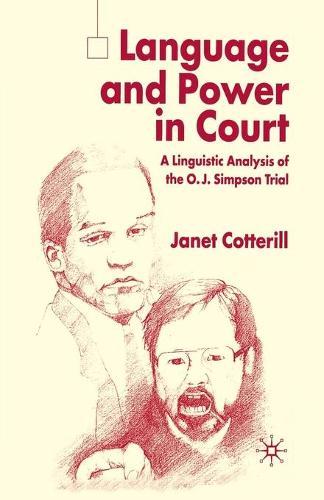Full Product Details
Author: J. Cotterill
Publisher: Palgrave Macmillan
Imprint: Palgrave Macmillan
Edition: Softcover reprint of the original 1st ed. 2003
Weight: 0.330kg
ISBN: 9781349428960
ISBN 10: 1349428965
Pages: 245
Publication Date: 01 January 2003
Audience:
Professional and scholarly
,
Professional & Vocational
Format: Paperback
Publisher's Status: Active
Availability: Manufactured on demand

We will order this item for you from a manufactured on demand supplier.
Reviews
'Language and Power in Court is a riveting treatment of the many ways that linguistics applies to a criminal case. Most forensic linguistics books and articles deal with bits and pieces of trials. Not Cotterill. She analyzes mountains of data from the beginning jury selection process to the post-acquittal aftermath of this nine month trial - a holistic approach if there ever was one. Impressively she draws on research from a number of disciplines besides linguistics, including psychology, sociology, criminology and law. She calls on discourse analysis to describe how both the prosecution and the defense told the different stories they wanted the jury to hear. She Calls on the CobuildDirect corpus to provide a powerful analysis of connotations used by both sides in the case. As might be expected there is also an abundance of attention to the questions and answers that frame a jury trial. She shows how lawyers use their own metaphors and reframe the opposition's metaphors to their own advantage. The underpinning message of the book, however, is language power - what it is, how it is managed, and what it accomplishes. Since a host of fields are now trying to determine just how power works, the verbal duels of the trial of a century provide a memorable battlefield for Cotterill's analysis.' - Professor Roger Shuy, Distinguished Research Professor Emeritus, Georgetown University 'Cotterill's skills as a linguist...combine with this rich source of data to produce an original piece of work that goes well beyond current scholarship in analyzing the various power relationships in the trial process through close examination of the language used.' - Lawrence M. Solan, Professor of Law, Brooklyn Law School
'Language and Power in Court is a riveting treatment of the many ways that linguistics applies to a criminal case. Most forensic linguistics books and articles deal with bits and pieces of trials. Not Cotterill. She analyzes mountains of data from the beginning jury selection process to the post-acquittal aftermath of this nine month trial - a holistic approach if there ever was one. Impressively she draws on research from a number of disciplines besides linguistics, including psychology, sociology, criminology and law. She calls on discourse analysis to describe how both the prosecution and the defense told the different stories they wanted the jury to hear. She Calls on the CobuildDirect corpus to provide a powerful analysis of connotations used by both sides in the case. As might be expected there is also an abundance of attention to the questions and answers that frame a jury trial. She shows how lawyers use their own metaphors and reframe the opposition's metaphors to their own advantage. The underpinning message of the book, however, is language power - what it is, how it is managed, and what it accomplishes. Since a host of fields are now trying to determine just how power works, the verbal duels of the trial of a century provide a memorable battlefield for Cotterill's analysis.' - Professor Roger Shuy, Distinguished Research Professor Emeritus, Georgetown University 'Cotterill's skills as a linguist...combine with this rich source of data to produce an original piece of work that goes well beyond current scholarship in analyzing the various power relationships in the trial process through close examination of the language used.' - Lawrence M. Solan, Professor of Law, Brooklyn Law School
Author Information
JANET COTTERILL is Lecturer in Language and Communication, at the Centre for Language and Communication Research at Cardiff University, UK. She is joint editor of Forensic Linguistics: The International Journal of Speech, Language and the Law. She edited the book Language in the Legal Process, published in 2002.




